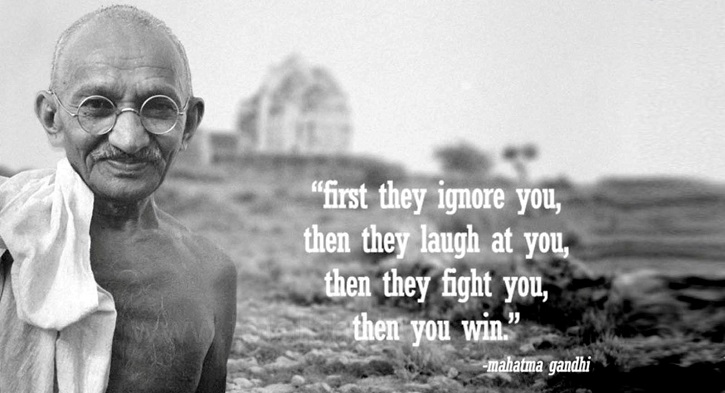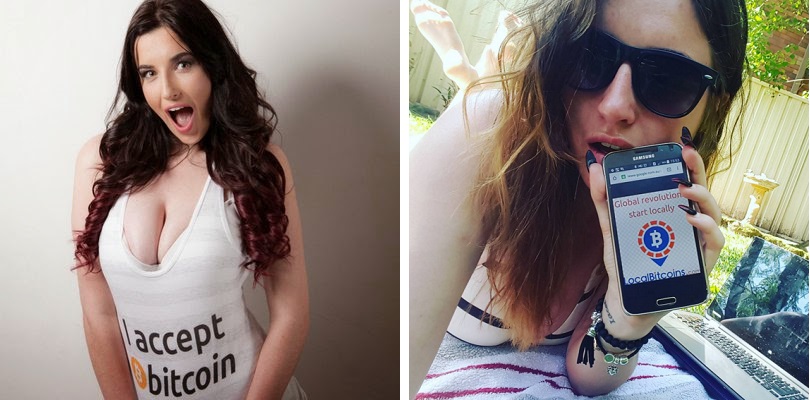Michaela Juric, aka Bitcoin Babe, an Australian based Bitcoin trader, has seen one of her bank accounts abruptly shut down after she sold around 10,000 USD of Bitcoin, on claims of fraud from the bank. She has started a petition calling for ACCC action of control over banks’ actions in regard to Bitcoin.
This is only one of the latest of several events that are affecting small Bitcoin traders and miners all around the world, and the situation is expected to worsen day by day, while governments and banks try to squeeze Bitcoin out of their countries.
But do not despair: as Mahatma Gandhi once said:
“First they ignore you, then they laugh at you, then they fight you. Then you win.”
Well, that’s a misattributed quote, as there’s no proof Gandhi ever said that in his life, but we’ll keep it as good for the sake of poetry. Anyway, the sentence fantastically applies to the history of Bitcoin.
In fact, we can identify a first embryonal period, from 2009 to 2010, when nearly nobody was aware of Bitcoin.

First They Ignore You
Then, from 2011 to 2012, Bitcoin’s fame began to spread, but it was ignored: bankers, financial experts, and don’t even mention common people, they didn’t care about it at all. If you mentioned it to somebody, they would dismiss you with a “what do you want to do with that?” or “we don’t need another currency” or anything else. Bitcoin was simply too weak to convince most people it was worth something.
It was a thing for a very restricted population of the very open minded and people of the “revolutionary” type. Nerds and anarchists were its first adopters.
So many said it was just a phenomenon for nerds or a Ponzi scheme or simply an experiment that would have disappeared shortly. Very few could understand how it worked.
Then They Laugh At You
But from 2013 to 2014, word of Bitcoin left the internet and it began to be mentioned on traditional media.
This was the mockery phase: many more people knew about Bitcoin now, but it just looked so strange and different from anything seen up to that moment, that nobody could believe it was of any value.
Look at all those poor nerds wasting money on that Ponzi scheme! What is Bitcoin anyway?
Also some venture capitalists fell for this thing and wasted more than 300 millions of dollars! LOL!
There was a lot of laughter, yes.
Then They Fight You
But 2015 has already changed everything. Bitcoin is definitely out of the clown costume except for a few obtuse remaining skeptics, and this year saw the switch from derision phase to fight phase. After almost one billion dollars were invested in Bitcoin infrastructures, softwares and services, the financial world finally understood that Bitcoin isn’t a nerd quirk or a Ponzi, they are now well aware of the fact that Bitcoin is a concrete reality and it’s stealing “their” money in the form of non-perceived fees on transactions. And it doesn’t look to be easy to stop. Banks also understood that blockchain technology can be useful and they are implementing it in their systems in the hope that can help them fight Bitcoin.
But the most fearful of all are the Central Banks: for them, rulers over everything, Bitcoin is a wild horse that could spell their end.
Well aware of the menace, top bankers are now speaking against Bitcoin on every possible occasion, still trying to ridicule it, but in a whole different manner: by including subtle menaces.
And by their side, of course, governments do their part in their attempt to stop it, by banning banks from exchanging the cryptocurrency, or proposing absurd white papers for laws to ban cryptography from all mobile phones, and not wasting the chance of using terrorist attacks as an excuse to eliminate it altogether.
Then You Win
Or… do you?
The fight has started, it’s a war, and it’s difficult to say how long it will last. One thing is certain, Bitcoin can’t win the war alone: its power are its users. Early adopters will have to fight for it and help clear its path, and the time is now. The third phase has just begun and the war will probably last years until Bitcoin will be so widely adopted that its resilience will grant it “immortality”.
The War Is On
Apart the mentioned methods to try to eliminate Bitcoin from the scene, there are more “in detail” and straight ways to fight it, and some banks seem to be stretching the limits of legality.
Michaela Juric, aka Bitcoin Babe, an Australian based Bitcoin trader recently stumbled into an episode that looks out of legality: her bank closed her account abruptly and claimed fraud after she sold around 10000 USD of Bitcoin to different clients. She must now rely on her clients’ honesty to recover that money, and the bank didn’t care about seeing her proof of a legitimate trade.
“I told my bank, no its not I did a KYC/AML check (made the customer take a selfie with their ID and then a photo of their ID next to the computer screen, clearly showing they are buying bitcoin).
They refused to accept that, returned my funds to the buyers without proper investigation and shut down my account immediately. Because of the abrupt shut down, almost $10,000 worth of pending transfers into my account have now bounced, despite me already releasing bitcoin for these orders.”

Time For A Class Action
Michaela says that this is only the latest in a series of episodes that seem like a concerted move to remove Bitcoin from circulation even though it hasn’t been declared illegal, and the first time she’s been called a fraud for selling Bitcoins.
After this last event, she decided to start a petition to push the ACCC (Australian Competition and Consumer Commission) to investigate the banks’ behaviour in regards to Bitcoin trading. She says that banks have no right to close accounts claiming fraud by people selling Bitcoin, because Bitcoin is legal in Australia:
“Bitcoin is recognised by the Australian Taxation Office as a taxable item, and thus is subject to GST, as any other business would be. Bitcoin businesses are also required to conduct Know Your Customer (KYC) and Anti-money Laundering checks, the exact same laws that banks must follow. Despite this step in trying to regulate it, and make it safe for all, Banks still refuse to deal with Bitcoin businesses, and in some cases, deny their customers access to even buy Bitcoin!”
All Over The World
Of course, Australia is not the only country where banks are fighting Bitcoin, citing this or that reason. A Bitcoin ATM manager from the USA that prefers to remain anonymous, says that he has seen 14 bank accounts closed in the last year due to the fact that banks do not want to deal with cash. There’s a mechanism to keep banks “clean”, that makes it legit to close bank accounts when people bring cash money of unknown origin:
“A compliance officer doesn’t get rewarded for allowing a bank account to stay open, if it turns out there is a problem with that money, he gets in trouble. If he closes an account, he reduces his own personal risk and in fact is rewarded. The more accounts they close down due to high risk, the better they look. They cannot afford to be wrong ever so they just simply close anything that could possibly get them into trouble. The bank itself can’t even question them because if they are wrong they will literally go to jail.
It’s not that the banks are making a decision that they don’t like bitcoin and are going after bitcoin to stop its adoption. Its because banks don’t take risk, and cash business is risk and why would they do that? Compliance officers don’t get rewarded for taking risk, they get rewarded when they identify high risk and mitigate it.
Perfect example: I had a great relationship with a large bank, the branch manager, the regional managers, they loved us. But one compliance officer said, NOPE too much cash. They shut it down. That compliance officer was seen as a hero for saving the bank from risk.”
And of course cash coming from Bitcoin selling is of unknown origin.
What if you buy a car with cash and then the seller brings that cash to the bank? I guess the bank wouldn’t make any problems, right? But the seller surely doesn’t know where that cash comes from.
This is just the beginning: banks are tightening the screws to squeeze Bitcoin out of the system and reduce exchanges for fiat in any legal (and maybe even not so legal) way available, and one of the events that Bitcoin could see in 2016 could well be a resistance in value rising due to renewed difficulties in its circulation.
There have been a couple of crises already in the past 2 years, but the biggest ones have yet to come. The Bitcoin community will have to hold strong and smash the wall that corporations and institutions are building in front of it, no matter how fierce the war will become.
